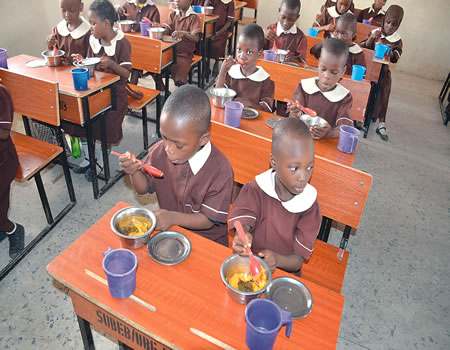Chairman, Code of Conduct Bureau (CCB), Prof. Isa Mohammed on Thursday vowed to expose any public officer who indulges in unethical practices during the implementation of Federal Government’s Modified Homegrown School feeding programme across the country.
Prof. Mohammed stated this during the flag-off ceremony held at Kuje Area Council in Abuja.
Tribune Online reports that the Minister of Humanitarian Affairs, Disaster Management and Social Development, Sadiya Umar Farouq who flagged off the programme disclosed that a total of 3.179 million households will benefit from the scheme across the country.
As earlier announced by the Ministry, each of the beneficiaries is entitled to a take-home ration comprising: 5kg bag of rice, 5kg bag of beans, 500ml Vegetable oil, 750ml palm oil, 500mg salt, 15pieces of eggs,140gm tomato paste, valued at N4,200.
While noting that the few people who benefited from the palliatives distributed at the flag-off ceremony in Kuje Area Council of Abuja, was insufficient to assess the implementing officers, the CCB chairman reiterated the resolve of the Bureau to examine thorough evaluation process.
Prof. Mohammed read the riot act to the public officers, warning all public officers involved in the implementation of the scheme not to turn themselves to beneficiaries of the programme.
He said that all hands are on deck to monitor and report breaches, adding that the CBB officials will be deployed to carry out their constitutional functions in line with the 1999 Constitution (as amended).
When asked if the Modified Homegrown School feeding programme is a showmanship, Prof. Mohammed said: “I will not say it holds water. Our own as Code of Conduct Bureau is to observe what they are doing and according to the guidelines that we receive.
“I think so far they have complied with the guidelines,” which includes: “issuance of voucher, the giving of the pack after receiving the voucher.
“Which means they will use this voucher to account for what has been distributed. So those modalities have been followed.
“But at the end of it, as Code of Conduct Bureau members, we are also interested in the post mortem examination because what we have seen is just a few.
“Because they said about 3 million houses will be beneficiaries. So, we cannot see the 3 million here,” he argued.
In the bid to ascertain the veracity of the documents on the full implementation of the programme, he assured that the Bureau “will go out to verify the actual performance at the end of the programme so that we should be able to have our report both in observation and in the actual verification,” he explained.
When asked whether the Bureau is acquainted with any allegations bothering on diversion of items and misapplication of funds, Prof. Mohammed explained that the Bureau won’t base its activities on speculations but empirical evidence.
“As Code of Conduct Bureau, allegations don’t really matter to us, we don’t work with speculations; we work on actual things we see. That’s why we are here.
“Whatever allegations you lay in any place, we wouldn’t use that to work. We don’t want to work from solution to problem, we work from problem to solution,” he noted.
ALSO READ: COVID-19 care now available for all who need it ― PTF
Speaking during the exercise, the Minister who was saddled with the responsibility of implementing various components of the National Social Investment Programme (NSIP), explained that the modified National Home-grown School Feeding Programme funded by the Federal Government will be implemented by FCT Administration and states governments.
“I am therefore here to flag off the commencement of the modified program in the FCT and to conduct spot checks of the operations. Hunger is a serious by-product of this pandemic crisis, which is why from the onset the Ministry has been evolving strategies to facilitate humanitarian interventions.
“The commencement of the school feeding programme today is based on Mr President’s directive to the Federal Ministry of Humanitarian Affairs, Disaster Management and Social Development to liaise with state governments to develop strategies on the continuation of the school feeding programme.
“The Ministry in consultation and collaboration with state governments identified the distribution of Take-Home Rations (THR) to the households of the children on the programme as a feasible method of achieving this directive after exploring several options.
“This is a globally accepted means of supporting children to continue to have access to nutrient-rich foods despite disruptions to the traditional channels of school feeding.
“Beginning today in Abuja, this programme will target parents and guardians of children in primary 1 to 3 in public schools participating in the programme. A total of 3.179 million households are targeted for this intervention. Lagos and Ogun States are next ports of call before the programme moves to other states of the federation.
“As noted earlier, we are working with the World Food Programme who are providing technical support while other agencies of government have been invited to provide an extra layer of monitoring. They include the DSS, EFCC, ICPC, Code of Conduct Bureau and a host of NGOs and CSOs.
“The Ministry is using the opportunity of this modified program to collect and verify data with the support of CSOs and NGOs such as ActionAid, BudgIT, Tracka, and CMDA. We are thankful for the support of NGOs including Wimbiz, Waterlight initiative, AU ECOSOC, Orphans and women support initiative, Youth fighters for COVID-19, Nigerian Red Cross, Coalition of NGOs and CSOs against COVID-19, Africa global empowerment and development network and a host others supporting the Ministry.
“We are working hard with our partners to mitigate the challenge posed by hunger, especially during this trying period. Please be assured that we are focused, determined and committed to cushioning the effects for Nigerians,” Farouq stated.






